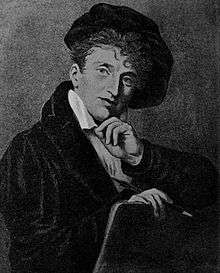Ludwig Geyer

Ludwig Geyer (21 January 1779 – 30 September 1821) was a German actor, playwright, and painter.
Life and career
Born in Eisleben, he was the stepfather of composer Richard Wagner, whose biological father had died some six months after his birth. According to Wagner's biographer Glasenapp, Geyer married Wagner's mother Johanna Rosine (née Pätz) after Wagner's birth; for his first few years Richard went under the surname Geyer. However it is possible that Geyer and Johanna did not marry legally, as no record of the marriage has been found.[1]
In his 'Autobiographic Sketch' Wagner describes him as 'a comedian and a painter; he was also the author of a few stage plays, of which one, [...] The Slaughter of the Innocents, had a certain success'. On his deathbed, according to Wagner, Geyer asked his mother 'has he perchance a talent for music?'.[2]
Geyer grew up in Artern and attended gymnasium in Eisleben. He started studying jurisprudence at the University of Leipzig but had to quit in 1799 when his father died after an accident. Geyer turned his hobby to his profession and earned the living expenses for his family by selling small portrait paintings.
In 1801 he came back to Leipzig where he met Friedrich Wagner who cared for him like a father. It was at his advice that Geyer went to the stage. He performed in little theaters in towns such as Magdeburg, Braunschweig, Stettin and Breslau. In Magdeburg he became a Freemason.[3] In 1809 Geyer joined the well known Secondasche Gesellschaft in Leipzig, whose members were given the rank of court actors.
Friedrich Wagner died after the Battle of Leipzig of typhus and Geyer married his widow. In 1814 his theatre company became part of the royal ensemble in Dresden where he made a friendship with Carl Maria von Weber. In 1815, Geyer's daughter Augusta Cäcilie was born, who later married the publisher Eduard Avenarius and was the mother of Richard Avenarius and Ferdinand Avenarius.
Later in life, in the course of preparing his autobiography, Mein Leben, Wagner received from his sister Caecilie a cache of letters written by Geyer that led him to believe that Geyer was his biological father, and possibly (and incorrectly) to believe that Geyer was Jewish;[4] the correspondence was subsequently lost or, some have suggested, destroyed by Wagner.[5][6] Geyer's relation to Wagner was one of several controversies surrounding the composer during his lifetime and afterward.
See also
Notes
- ↑ Gutman (1990), p.7 and note.
- ↑ Wagner, Richard, tr. W. Ashton Ellis (1993) The Art-Work of the Future and other Works Lincoln and London ISBN 978-0-8032-9752-4
- ↑ Richard Wagner - sein Leben und seine Werke (www.internetloge.de)
- ↑ Gutman(1990) 4-5
- ↑ Conway, David (2002), "'A Vulture is Almost an Eagle' ... The Jewishness of Richard Wagner", Jewry in Music website, accessed 16 May 2013.
- ↑ Conway, David (2012). Jewry in Music: Entry to the Profession from the Enlightenment to Richard Wagner, Cambridge: Cambridge University Press. ISBN 978-1-107-01538-8
Sources
- Gutman, Robert W. (1990), Richard Wagner: The Man, his Mind and his Music, New York: Harcourt, Brace and Jovanovich ISBN 978-0-15-677615-8
External links
- An article that relates Ludwig Geyer to Richard Wagner
- My life By Richard Wagner, Andrew Gray, Mary Whittall
- Meixner, Elisabeth (1964), "Geyer, Ludwig Heinrich Christian", Neue Deutsche Biographie (NDB) (in German), 6, Berlin: Duncker & Humblot, pp. 359–360
- Geyer in Dresden